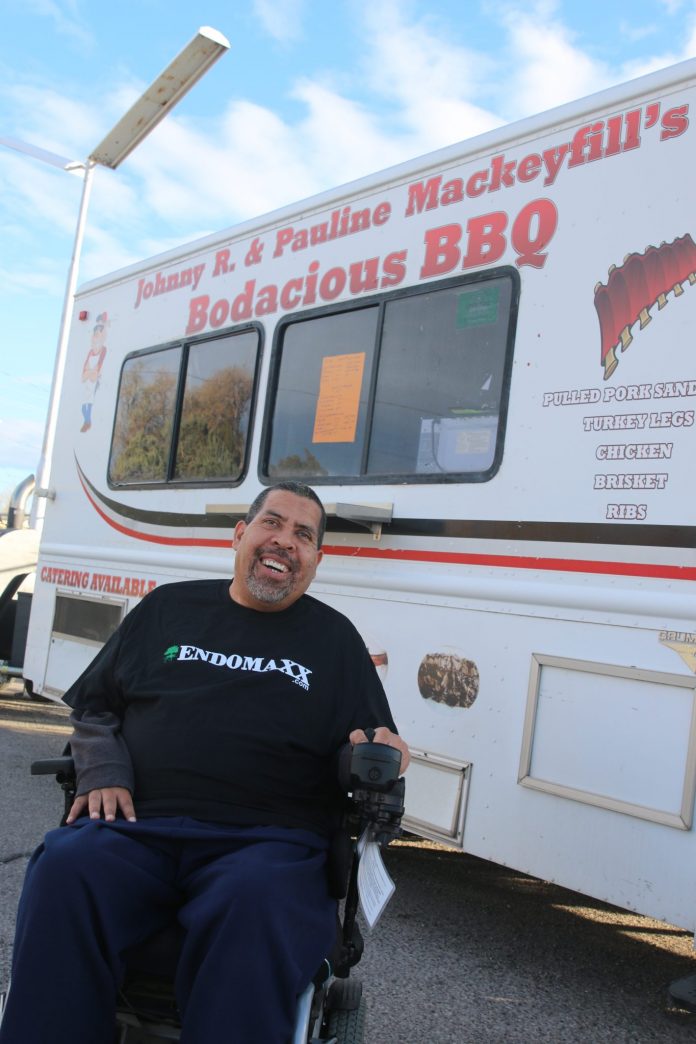By Lisa Hlavinka
Volume 4 Issue 5
He was diagnosed quadriplegic when he was only seventeen years old. Today, 48-year-old Johnny Mackeyfill credits cannabis with not only easing his pain, but also extending his life.
From his home in the South Valley of Albuquerque, Mackeyfill—known as “Johnny Mack” by his friends—said that cannabis has helped treat the physical effects of his injury and cope with the emotional aftermath of the crime.
“It’s amazing, the effects it has,” Mackeyfill said. “I got on the medical program and it’s been a success for me.”
Mackeyfill was shot three times, in the face, head and neck, on June 29, 1985. The injury to his C-3 and C-4 vertebra caused him to become quadriplegic, and he also suffered a traumatic brain injury (TBI).
The night he was shot, doctors thought Mackeyfill would need machines to breathe for the rest of his life, Mackeyfill’s parents were told that he would likely be in a persistent vegetative state due to his TBI.
“They pronounced me dead, a priest read me the last rights,” he said. “I came out of my coma in three days. I shocked them all.”
Mackeyfill spent three months and four days in the hospital before he was released. Today, he lives with his parents and sister Pauline, who is his caregiver. Albuquerque residents may know the Mackeyfill family through their food truck, Bodacious BBQ, a favorite by locals in the South Valley.
Before medical cannabis was legalized in New Mexico, Mackeyfill occasionally smoked poor quality street marijuana, but it wasn’t until medical marijuana was legalized in 2007 that Mackeyfill began to reap the therapeutic benefits of cannabis.
“When they started giving out the cards, I was one of the first people to get one,” he said.
He has found medical cannabis to be a panacea that he uses to treat several different conditions at once. Mackeyfill ingests CBD oil three times per day, and smokes medical cannabis daily to treat and control the symptoms of a multitude of conditions.
Seizures
Due to the TBI, Mackeyfill experienced both grand mal seizures and absence seizures for nearly a decade after the injury. Grand mal seizures caused him to lose consciousness and experience violent muscle contractions, while absence seizures caused him to lose awareness, or “daze out”.
“You could be talking to me and I could be looking at you, listening, but not there,” he said of the absence seizures.
When he began to smoke medical cannabis, Mackeyfill noticed a reduction in the frequency of seizures he was experiencing, and today, he said it has been twelve years since he has experienced a seizure of either type.
“You know, I have not had a seizure for years, and it’s been since I have been smoking,” he said.
Spasticity
Mackeyfill has also had to contend with spasticity. Spasticity effects most quadriplegics and can include uncontrollable muscle, sudden contractions of muscle groups and abnormal tone in the muscles, according to the Christopher & Dana Reeve Foundation.
“My whole body will have a spasm,” Mackeyfill said. “Spasms will knock people out of a chair.”
Cannabis reduced Mackeyfill’s spasticity, reducing his symptoms so doctors could take him off Baclofen, a prescription muscle relaxant. Cannabis oil helped to control the spasms, allowing him to stop taking Baclofen and four other medications. He said that this has helped his appetite, since taking pills for so many had eaten away at the lining of his stomach.
Mackeyfill medicates with cannabis before physical therapy sessions, a decision he said his physician supports. Controlling spasticity beforehand allows Mackeyfill to enjoy more efficient progress during therapy.
“I’m more relaxed, I have less tone, I have less spasticity, so it’s easier to work with me,” he said.
Polycythemia Vera
About eight years ago, Mackeyfill was diagnosed with polycythemia vera, a type of blood cancer that causes the bone marrow to produce too many red blood cells. The red blood cells can clump together, causing clots in the blood vessels and leaving sufferers more susceptible to heart attacks and strokes.
The treatments require Mackeyfill to see a physician every two weeks to draw two bags of blood, which has ultimately caused iron deficiency and anemia. If doctors do not draw blood, Mackeyfill experiences painful headaches and a reddened face.
Recently, he began taking high-CBD cannabis oil to control his symptoms. Doctors have to draw blood if his red blood cell count is above 15. Since adding CBD oil to his regimen, he has lowered his red blood cell count from 14.9 to 13.7 in only few short months. He credits the synergistic combination of both THC and CBD for relieving his symptoms and lowering his red blood cell count.
“I don’t think it’s ever been that good,” he said.
PTSD
Mackeyfill was diagnosed with post-traumatic stress disorder (PTSD) and said that cannabis helps him cope emotionally with the crime committed against him.
“I deal with a lot of…’what if, what if?’ But with cannabis, you don’t get the ‘what ifs,’” he said.
His friends were concerned with how Mackeyfill would feel when the perpetrators were released from jail, but he said cannabis helped him control his anger.
“I have a case manager, a case coordinator. They were like, ‘oh you’re not afraid to see him?’ You know what? I don’t have time to trip on things like that. But if it wasn’t for cannabis, those things I’d trip on.”


















